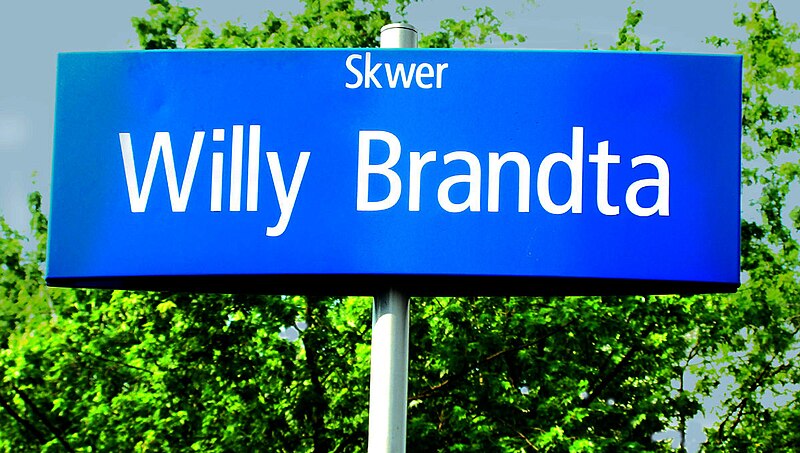I constantly run into Net articles about an exemplary cooperation of Poland and Germany in today`s Europe.
MediaWatch made a good thread once:
polishforums.com/history-poland-34/poland-germany-look-back-years-things-common-53755/ - Poland and Germany look back 1000 years of things in common
How did it go that two mortal enemies changed into partners? (Friends would be too much).
An old Polish saying goes: Jak świat światem, nie będzie Niemiec Polakowi bratem. As long as the world is going, never will a German be a brother for a Pole.
It seemed true during and after WW2. Let`s recall facts what Germans did in Poland:
3 million Polish Jews annihilated in death camps or ghettos.
1.7 - 1.9 million Poles exterminated in executions, pacifications, raids, roundups.
0.65 million died in military campaigns.
Not to mention destroyed cities, devastated industry, culture, historical monuments.
Poland wasn`t the Land of Plenty before the war, true, but afterwards it was like The Waste Land.
How did burying the hatchet start?:
Due to allies` post war scheme, Polish borders were shifted westwards, thus eastern German lands became Polish western territory. A few million Germans were resettled to Germany proper.
In Cold War era, with two conflicted blocks, the Polish borders became a hot issue:
goethe.de/ins/jp/lp/prj/wza/depl/en2260368.htm
In 1961 a few representatives of German protestant churches issued a declaration of border recognition, which later, in 1965, grew into an official memorandum, calling for the German government to acknowledge the new Polish German borders.
Soon afterwards, in November 1965, Polish bishops issued a famous declaration of forgiveness, known as the Letter of Reconciliation.
en.wikipedia.org/wiki/Letter_of_Reconciliation_of_the_Poli sh_Bishops_to_the_German_Bishops
While recalling past and recent historical events, the bishops stretched out their hands in forgiveness and are asking for forgiveness. Here referred to as Letter of Reconciliation of the Polish Bishops to the German Bishops it is actually only one part of the extensive groundbreaking invitation and letter, where they declared: "We forgive and ask for forgiveness" (for the crimes of World War II).
Among prominent supporters of this letter was Archbishop Karol Wojtyła, who later became Pope John Paul II in 1978.
The letter was answered by bishops of both of the then-two Germanys together.
Polish communist rulers were furious:
en.wikipedia.org/wiki/Letter_of_Reconciliation_of_the_Polish_Bishops_to_the_German_Bishops
TBC
MediaWatch made a good thread once:
polishforums.com/history-poland-34/poland-germany-look-back-years-things-common-53755/ - Poland and Germany look back 1000 years of things in common
How did it go that two mortal enemies changed into partners? (Friends would be too much).
An old Polish saying goes: Jak świat światem, nie będzie Niemiec Polakowi bratem. As long as the world is going, never will a German be a brother for a Pole.
It seemed true during and after WW2. Let`s recall facts what Germans did in Poland:
3 million Polish Jews annihilated in death camps or ghettos.
1.7 - 1.9 million Poles exterminated in executions, pacifications, raids, roundups.
0.65 million died in military campaigns.
Not to mention destroyed cities, devastated industry, culture, historical monuments.
Poland wasn`t the Land of Plenty before the war, true, but afterwards it was like The Waste Land.
How did burying the hatchet start?:
Due to allies` post war scheme, Polish borders were shifted westwards, thus eastern German lands became Polish western territory. A few million Germans were resettled to Germany proper.
In Cold War era, with two conflicted blocks, the Polish borders became a hot issue:
In 1950 the communist GDR officially recognised the border to its sister state within the Soviet sphere, whereas the democratic Federal Republic of Germany, in line with an agreement made with the three western powers (USA, Great Britain and France), reserved the right to wait until the question of the legality of the "former eastern territories of Germany" had been settled by a final peace treaty signed by all the victors of the war. In Germany the Associations for Displaced Germans came into being and in 1950 they solemnly declared their intention to secure their right to their homeland - this time without the use of force.
goethe.de/ins/jp/lp/prj/wza/depl/en2260368.htm
In 1961 a few representatives of German protestant churches issued a declaration of border recognition, which later, in 1965, grew into an official memorandum, calling for the German government to acknowledge the new Polish German borders.
Soon afterwards, in November 1965, Polish bishops issued a famous declaration of forgiveness, known as the Letter of Reconciliation.
en.wikipedia.org/wiki/Letter_of_Reconciliation_of_the_Poli sh_Bishops_to_the_German_Bishops
While recalling past and recent historical events, the bishops stretched out their hands in forgiveness and are asking for forgiveness. Here referred to as Letter of Reconciliation of the Polish Bishops to the German Bishops it is actually only one part of the extensive groundbreaking invitation and letter, where they declared: "We forgive and ask for forgiveness" (for the crimes of World War II).
Among prominent supporters of this letter was Archbishop Karol Wojtyła, who later became Pope John Paul II in 1978.
The letter was answered by bishops of both of the then-two Germanys together.
Polish communist rulers were furious:
Widely publicised in Poland's churches, the letter drew a strong reaction from the Communist authorities of the People's Republic of Poland. Władysław Gomułka saw it as clearly aimed at countering his propaganda, which saw West Germany as the main external enemy of Poland and hostility between Poland and West Germany as one of the main guarantees of social order in the Recovered Territories.
To counter the threat of losing control over people's minds, the Communist authorities reacted with anti-German and anti-Catholic hysteria. The Primate of Poland, Stefan Wyszyński, was denied a passport for his trip to Rome and on January 15, 1966 [...]
To counter the threat of losing control over people's minds, the Communist authorities reacted with anti-German and anti-Catholic hysteria. The Primate of Poland, Stefan Wyszyński, was denied a passport for his trip to Rome and on January 15, 1966 [...]
en.wikipedia.org/wiki/Letter_of_Reconciliation_of_the_Polish_Bishops_to_the_German_Bishops
TBC
 PolishForums LIVE / Archives [3]
PolishForums LIVE / Archives [3]


